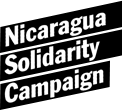Beyond austerity: the example of Nicaraguan trade unions
NSCAG News |
on: Thursday, 9 January 2014
Ruby Cox, UNISON activist and former chair of NSC, explains what UK trade unionists can learn from their Nicaraguan counterparts about survival against enormous odds.
It’s easy to get confused with so many solidarity groups and so many competing demands for trade union resources. Latin America in particular is a focus for the hopes and fears of many in the trade union movement, so naturally people want to keep up to date with events, understand what’s going on and know how to offer effective support. But whilst Latin America as a whole is uniting to benefit the region in ways that could not be achieved by individual countries (e.g. through ALBA and other forms of regional integration), each country also has its own individual story and its own individual path to follow.
As a trade union activist within UNISON and subsequent Chair of NSC, I had the opportunity to visit two Latin American countries,Cuba and Nicaragua. Trade unionists already know a great deal about Cuba, courageously standing up to the United States and somehow surviving the vicious blockade which has crippled their economy since it was imposed in 1960, and so they know why Cuba deserves our support. But for me, the Nicaraguan story is just as inspiring, and the people just as courageous, and here’s why.
The Sandinistas first took power in 1979, ousting the hated dictator Somoza and bringing hope to millions of a new era of social progress. But the United States government did not see things that way, and although the Sandinistas won elections in 1984, by 1990 voters were exhausted by the US imposed contra war and trade embargo, and voted in a right wing coalition instead.
When I first visited Nicaragua in 2002, the state of the trade unions was indeed pitiful. Sixty-six per cent of workers in the public sector had been made redundant and as a consequence, the much weakened trade unions were powerless to confront attacks on workers’ rights. Unions continued to lose members because workers either could not afford to pay the tiny subscriptions to join or were simply afraid of being the target of the next cull. Only the most committed and courageous were prepared to stand their ground and not let bullying employers and corrupt officials have it all their own way.
Yet somehow they survived to see the next chapter, and those who thought that nothing could stand in the way of privatisation and the destruction of public services were in for a shock. In 2006 the Sandinistas were once again triumphant and Daniel Ortega, leader of the party, was elected President. The effect this had on trade union membership and on trade union morale in general was immediate, and between 2007 and 2013 membership of UNE, the public service union, shot up by 700%, from 5,000 to 35,000.
When I visited again in 2009, there was optimism and jubilation everywhere. Young people and women in particular were putting themselves forward for training and for leadership roles within their trade unions, clearly determined to seize every opportunity (some with financial support from UNISON) to ensure that they would never return to a position of powerlessness. A range of new laws to protect workers’ rights was being introduced and education and healthcare were once again free. It was a country racing away from the bad old days with the clear intention never to return. It was a wonderful place to be and a wonderful thing to witness, and it reminded me how alive, how vibrant and vital, a trade union at its best can really be.
And so for me, this is a story that we need to know is possible. In the present dark days of the Cameron government, characterised by greed, cruelty and the wanton destruction of public services, we need to know that we can and we will survive, and so will our trade unions. It’s hard to hang on to that sort of optimism when confronted on a daily basis by the portrayal of trade unions as out of touch and irrelevant, it’s hard when colleagues say there’s no point in joining a trade union and it’s hard when obscenities like zero-hours contracts undermine everything that trade unions have fought for over the years.
But the example of Nicaragua shows us that survival against the odds is possible, and we should not be downhearted. It shows us that even though it seems that so much that we fought for has been taken away from us, we can and will win it back. It shows us that we are not the first to struggle against “austerity”, nor will we be the last, and that’s why we have to win. It’s a global struggle, and whether we’re British or Nicaraguan we are committed to the same goal; a fair and compassionate society in a fair and compassionate world. By working together in solidarity, this is a goal which we will surely succeed in achieving.





